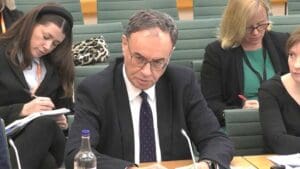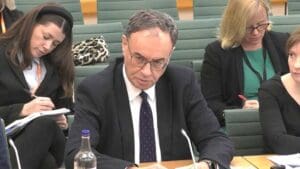Bank of England governor urges UK to rebuild EU trade ties as key summit looms


Andrew Bailey, the Governor of the Bank of England, has called for renewed efforts to rebuild trade ties with the European Union, warning that repairing the damage caused by post-Brexit disruption would be “beneficial” for the UK economy.
His comments come just ten days before a pivotal UK-EU summit in London, where Prime Minister Keir Starmer is expected to present a new strategic partnership aimed at “resetting” post-Brexit relations and reviving long-term trade flows.
“Having a more open economy to trade with the European Union … would be beneficial,” Bailey told the BBC. “There has been a fall-off in goods trade with the EU over recent years, and we must ensure Brexit doesn’t continue to damage the UK’s trade position.”
While stopping short of criticising Brexit directly, Bailey said reversing some of the negative economic consequences would support growth, particularly as the UK looks to reassert itself on the global trade stage.
The renewed focus on EU ties follows recent successes on other international trade fronts. Earlier this week, the UK signed a long-awaited free trade agreement with India, which Starmer described as a “landmark deal” projected to add £4.8 billion to the economy by 2040.
Bailey praised the government’s recent trade diplomacy, saying that the UK’s willingness to strike deals — including last week’s agreement with the United States — sends a positive signal to other nations about the importance of global trade cooperation.
“Trade deals can be done, and trade is important,” he said. “It’s good news in a world where the effective tariff rate is higher than it was before all of this started.”
While the UK-US agreement brings some relief, including reduced tariffs on UK car and steel exports, most tariffs on UK goods remain higher than pre-2024 levels due to President Donald Trump’s global tariff regime.
Speaking at an economics conference in Reykjavík, Iceland, Bailey said that the global economy remains volatile and central banks must be “nimble and robust” in the face of ongoing uncertainty, particularly as countries adjust to rising US tariffs.
The UK economy, already weighed down by tax rises and weak consumer spending, is further exposed by geopolitical trade disruptions. Although the Bank of England cut interest rates to 4.25% on Thursday, it warned that further cuts would only be made once there is greater certainty that inflation will fall to 2%.
Inflation currently stands at 2.6%, with the Bank forecasting a rise later this year — a key reason for the Monetary Policy Committee’s cautious approach to further rate reductions.
The Bank’s measured stance has prompted criticism from business groups and unions. The British Chambers of Commerce (BCC) and the Trades Union Congress (TUC) argue that the Bank is underestimating the severity of the economic downturn, with firms and households in need of more immediate support.
“Many firms, desperate for financial respite, will be keen to see further rate cuts in the months ahead,” said David Bharier, Head of Research at the BCC. “Confidence is being hit by the twin pressures of domestic tax rises and the global trade war.”
The TUC echoed those concerns, saying working families also need cheaper borrowing to cope with the cost of living.
Bailey’s remarks ahead of the London summit reflect a growing consensus that the UK must look again at its relationship with the EU — still its largest trading partner — as it seeks to revive investment, tackle inflation, and prepare for global trade realignment.
“We must not let political difficulty stand in the way of long-term prosperity,” Bailey said. “This is a moment for pragmatism and rebuilding.”
With the government poised to present a renewed UK-EU framework, Bailey’s intervention adds weight to calls for a more cooperative approach to trade — not just with new partners, but with those closest to home.
Read more:
Bank of England governor urges UK to rebuild EU trade ties as key summit looms






